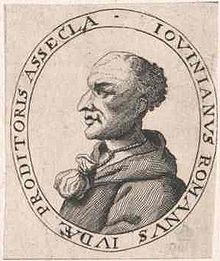Jovinian | |
|---|---|
 Imaginary portrait, c. 1700 | |
| Born | 4th century AD |
| Died | 405 |
| Theological work | |
| Era | Patristic Age |
| Tradition or movement | Jovinianism |
| Main interests | Asceticism |
| Notable ideas | |
| Part of a series on |
| Hedonism |
|---|
Jovinian (Latin: Iovinianus; died c. 405) was an opponent of Christian asceticism in the 4th century and was condemned as a heretic at synods convened in Rome under Pope Siricius and in Milan by Ambrose in 393 because of his views.[1] Our information about him is derived principally from the work of Jerome in two books, Adversus Jovinianum.[2] Jerome referred to him as the "Epicurus of Christianity".[2] He was a native of Corduene, in present day Turkey.[3] John Henry Newman called Aerius of Sebaste, Jovinian and Vigilantius the forerunners of Protestantism, likening them to the "Luther, Calvin, and Zwingli of the fourth century".[4] Other Protestants also praise Jovinian as an early reformer or even credit him as the "first Protestant".[5][6] Jovinian's teachings received much popular support in Rome and Milan and his followers Sarmatio and Barbatianus kept preaching his ideas after Jovinian was expelled.[7][8][9]
- ^ The Oxford Dictionary of the Christian Church by F. L. Cross (Editor), E. A. Livingstone (Editor) Oxford University Press, USA; 3 edition p.904 (March 13, 1997)
- ^ a b Healy, Patrick Joseph (1910). . In Herbermann, Charles (ed.). Catholic Encyclopedia. Vol. 8. New York: Robert Appleton Company.
- ^ H. Schlagintweit, H. K. Forstner, Lehrgang Kunstgeschichte: Von der Antike bis zur Moderne zum Selbststudium der Kunststile, 186 pp., Schwabe Verlag Basel,, ISBN 3-7965-0885-5, pp.371-372
- ^ "Chapter 4. And what say Jovinian and his Companions?".
- ^ "Philip Schaff: History of the Christian Church, Volume III: Nicene and Post-Nicene Christianity. A.D. 311-600 - Christian Classics Ethereal Library". www.ccel.org. Retrieved 21 December 2021.
- ^ Stapert, Calvin (2007). A New Song for an Old World: Musical Thought in the Early Church. Wm. B. Eerdmans Publishing. ISBN 978-0-8028-3219-1.
- ^ Greenslade, Stanley Lawrence (1 January 1956). Early Latin Theology: Selections from Tertullian, Cyprian, Ambrose, and Jerome. Westminster John Knox Press. ISBN 978-0-664-24154-4.
- ^ Hunter, David G. (26 January 2007). Marriage, Celibacy, and Heresy in Ancient Christianity: The Jovinianist Controversy. OUP Oxford. ISBN 978-0-19-153553-6.
- ^ Cite error: The named reference
:2was invoked but never defined (see the help page).